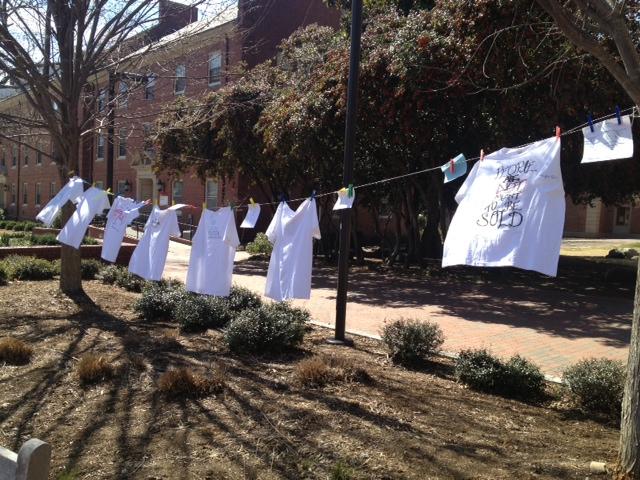Editor’s note: This article has been changed since was originally published.
The program also featured T-shirts which students who attended wrote the facts which they found to be most compelling about the film on. The shirts will be displayed on the Wolf Plaza near the Tri-Towers from 9 a.m. to 4 p.m. in order to raise awareness.
The panel was comprised of four members, each of which had both personal experience and expertise in the study of human trafficking. The panel included Patricia Witt, chair of Partners Against Trafficking of Human in North Carolina, Christine Shaw, director of Social Ministries at the Salvation Army, Abbi Tenaglia, founder and director of Transforming Hope Ministries, and Traci Rowe, executive director of North Carolina Coalition Against Human Trafficking.
According to all of the panelists the number one misinterpretation about human trafficking is that it is a problem which does not affect us locally. Avi Aggarwal, an organizer stated that fact that this occurs “right under our noses,” motivated her to address this issue.
The facts of the matter reiterate this point well. North Carolina ranks number eight in states where human trafficking is likely to occur in the United States. How much we take notice of the problem is not indicative of its scale.
According to the panelists it is difficult to get concrete data on exactly the extent to which this problem takes place.
According to Rowe, law enforcement officers are in an ongoing effort to deal with this problem. Also important to her was the universal nature of the problem.
“Sex and labor trafficking can and does happen to all kinds of people, people of all ages and economic statuses” said Avi. “Everyone has heard about it, but I never internalized it until I heard specific stories”.
The event was organized by students working on the behalf of Project FIGHT, the Salvation Army’s program aimed at combating human trafficking. The team of sophomores who organized the event are Avi Aggarwal who studies chemical engineering, Anna Paschall who studies biological sciences, Catierine McEntee who studies renewable energy, and Maggie Miller who studies psychology.
The film exposed the 32 billion dollar industry which has become an issue of epidemic proportions and shed light on implications of the issue at home and abroad.
According to the film the main purposes of human trafficking are to utilize slaves as prostitutes, agricultural or factory workers, and even soldiers in African militias.








